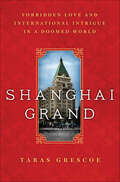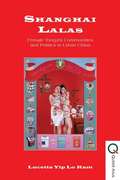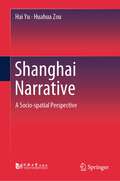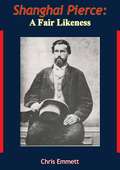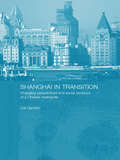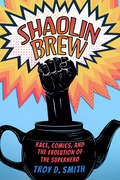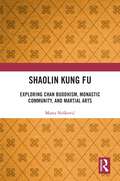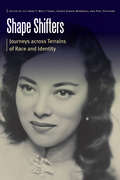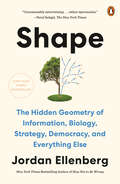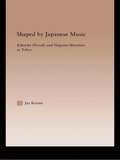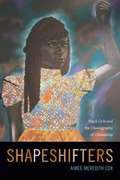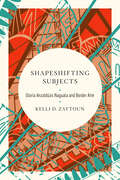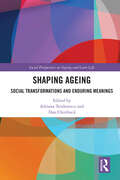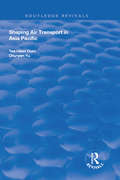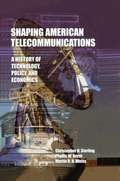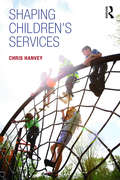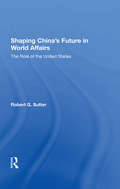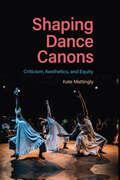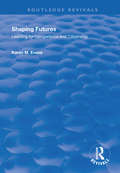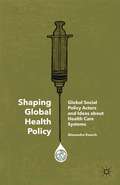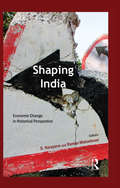- Table View
- List View
Shanghai Grand: Forbidden Love and International Intrigue in a Doomed World
by Taras GrescoeThe true story of a British aristocrat, an American flapper, and a Chinese poet trapped in an unlikely love triangle amid the decadence of Jazz Age Shanghai.On the eve of World War II, the foreign-controlled port of Shanghai was the rendezvous for the twentieth century’s most outlandish adventurers, all under the watchful eye of the fabulously wealthy Sir Victor Sassoon.Emily “Mickey” Hahn was a legendary New Yorker journalist whose vivid writing played a crucial role in opening Western eyes to the realities of life in China.At the height of the Depression, Hahn arrives in Shanghai after a disappointing affair with an alcoholic Hollywood screenwriter, convinced she would never love again. After checking in to Sassoon’s glamorous Cathay Hotel, Hahn is absorbed into the social swirl of the expats drawn to pre-war China, among them Ernest Hemingway, Martha Gellhorn, Harold Acton, and a colorful gangster named Morris “Two-Gun” Cohen. But when she meets Zau Sinmay, a Chinese poet from an illustrious family, she discovers the real Shanghai through his eyes: the city of rich colonials, triple agents, opium smokers, displaced Chinese peasants, and increasingly desperate White Russian and Jewish refugees—a place her innate curiosity will lead her to explore firsthand. Danger lurks on the horizon, though, as the brutal Japanese occupation destroys the seductive world of pre-war Shanghai, paving the way for Mao Tse-tung’s Communists’ rise to power.Praise for Shanghai Grand“A headlong swoon for old Shanghai. The feeling is easy to catch.” —The New York Times Book Review“Filled with excellent short character sketches and keeps the reader turning the pages to find out what happens next . . . Brings to life a special time and a special place.” —The Wall Street Journal“Grescoe exuberantly captures the glamour and intrigue of a lost world.” —Kirkus Reviews
Shanghai Homes: Palimpsests of Private Life
by Jie LiExploring three dimensions of private life territories, artifacts, and gossip Li re-creates the sounds, smells, look, and feel of home over a tumultuous century
Shanghai Homes: Palimpsests of Private Life (Global Chinese Culture)
by Jie LiIn the dazzling global metropolis of Shanghai, what has it meant to call this city home? In this account—part microhistory, part memoir—Jie Li salvages intimate recollections by successive generations of inhabitants of two vibrant, culturally mixed Shanghai alleyways from the Republican, Maoist, and post-Mao eras. Exploring three dimensions of private life—territories, artifacts, and gossip—Li re-creates the sounds, smells, look, and feel of home over a tumultuous century. First built by British and Japanese companies in 1915 and 1927, the two homes at the center of this narrative were located in an industrial part of the former "International Settlement." Before their recent demolition, they were nestled in Shanghai's labyrinthine alleyways, which housed more than half of the city's population from the Sino-Japanese War to the Cultural Revolution. Through interviews with her own family members as well as their neighbors, classmates, and co-workers, Li weaves a complex social tapestry reflecting the lived experiences of ordinary people struggling to absorb and adapt to major historical change. These voices include workers, intellectuals, Communists, Nationalists, foreigners, compradors, wives, concubines, and children who all fought for a foothold and haven in this city, witnessing spectacles so full of farce and pathos they could only be whispered as secret histories.
Shanghai Lalas: Female Tongzhi Communities and Politics in Urban China
by Lucetta Yip Lo KamThis is the first ethnographic study of 'lala' (lesbian, bisexual, and transgender) communities and politics in China, focusing on the city of Shanghai. Based on several years of in-depth interviews, the volume concentrates on 'lala's' everyday struggle to reconcile same-sex desire with a dominant rhetoric of family harmony and compulsory marriage, all within a culture denying women's active and legitimate sexual agency. Lucetta Yip Lo Kam reads discourses on homophobia in China, including the rhetoric of 'Chinese tolerance' and considers the heteronormative demands imposed on 'tongzhi' subjects. She treats 'the politics of public correctness' as a newly emerging 'tongzhi' practice developed from the culturally specific, Chinese forms of regulation that inform 'tongzhi' survival strategies and self-identification.
Shanghai Narrative: A Socio-spatial Perspective
by Hai Yu Huahua ZouThis book focuses on urban development in Shanghai over the past four decades, which is composed of two major development processes—the development of new spaces and the renewal of old ones. Seeking to bring the concept of space back into social analysis, the book explores changes affecting communities, interpersonal interactions, lifestyles and social mindsets in Shanghai from a spatial perspective. What’s more, all these social themes are presented using a narrative of spatial representation and spatialization. The book combines both academic and documentary-style contributions. It also provides cutting-edge research on the most representative case in Shanghai. As the book demonstrates, the story of social spaces in Shanghai is more than a combination of social analysis and spatial analysis but also involves historical analysis and contemporary narrative.
Shanghai Pierce: A Fair Likeness
by Chris Emmett“I am Shanghai Pierce, Webster in Cattle, by God, Sir.” And, in truth, he was. Part rascal, part gentleman, part poseur, part just himself—of all the colorful Texas figures following the Civil War none was as loud, garish, and funny as Shanghai Pierce, who left Rhode Island penniless and became one of the Big Pasture Men of southern Texas.At six foot, four, Shanghai Pierce was big, rich, and selfish, but he could also be kind. His cunning was seldom matched, and business, whether it involved a quarter-million-dollar loan or a twenty-five cent pair of socks, was his lifeblood.In recreating the life of Abel Head (“Shanghai”) Pierce, Chris Emmett unfolds the entire dramatic spectacle of the time and place in which Pierce lived. An arresting figure, Pierce was a symbol of his era. His statue, which he himself erected in Hawley, Texas, is still a perfect memorial to, and a reminder of, westward-moving America. Shanghai Pierce was a man who pulled up his roots and fled to the West, where he found there was ample room and opportunity.First published in 1953, Shanghai Pierce: A Fair Likeness won the 1953 Summerfield G. Roberts award of the Texas Institute of Letters for the best book on the Republic of Texas.
Shanghai in Transition: Changing Perspectives and Social Contours of a Chinese Metropolis
by Jos GambleIn the decades following the introduction of Communist Party rule in Shanghai in 1949, the city's economy, infrastructure and links with the world all atrophied. However, the past decade has seen far-reaching economic reforms implemented to recreate Shanghai as a cosmopolitan, world financial and trade centre. This book focuses on the lives of local residents and their perceptions of their changing city, and presents an evocative series of ethnographic perspectives of the city's shifting sociological landscape in this period of transition.
Shantytown, USA: Forgotten Landscapes of the Working Poor
by Lisa GoffShantytowns once occupied a central place in America's urban landscape. Lisa Goff shows how these resourceful dwellings were not merely the byproducts of hardship but potent assertions of self-reliance. Their legacy is felt in sites of political activism, from campus shanties protesting apartheid to the tent cities of Occupy Wall Street.
Shaolin Brew: Race, Comics, and the Evolution of the Superhero
by Troy D. SmithShaolin Brew: Race, Comics, and the Evolution of the Superhero looks at how the comic book industry developed from a white perspective and how minority characters were and are viewed through a stereotypical white gaze. Further, the book explores how voices of color have launched a shift in the industry, taking nonwhite characters who were originally viewed through a white lens and situating them outside the framework of whiteness. The financial success of Blaxploitation and Kung Fu films in the early 1970s led to major comics publishers creating, for the first time, Black and Asian superhero characters who headlined their own comics. The introduction of Black and Asian main characters, who previously only served as guest stars or sidekicks, launched a new kind of engagement between comics companies and minority characters and readers. However, scripted as they were by white writers, these characters were mired in stereotypes. Author Troy D. Smith focuses on Asian, Black, and Latinx representation in the comic industry and how it has evolved over the years. Smith explores topics that include Orientalism, whitewashing, Black respectability politics, the model minority myth, and political controversies facing fandoms. In particular, Smith examines how fans take the superheroes they grew up with—such as Luke Cage, Black Lightning, and Shang Chi—and turn them into the characters they wished they had as children. Shaolin Brew delves into the efforts of fans of color who urged creators to make these characters more realistic. This refining process increased as more writers and artists of color broke into the industry, bringing their own perspectives to the characters. As many of these characters transitioned from page to screen, a new generation of writers, artists, and readers have cooperated to evolve one-dimensional stereotypes into multifaceted, dynamic heroes.
Shaolin Kung Fu: Exploring Chan Buddhism, Monastic Community, and Martial Arts
by Marta NeškovićThis book investigates contemporary Shaolin Kung Fu, situated between tradition and modernity. Deeply rooted in the philosophical and religious traditions of Chan Buddhism and concurrently evolving under the influence of globalization, this martial art serves as a Chan Buddhist practice within the Shaolin monastic community. Illuminating the rich cultural heritage of Shaolin Kung Fu and its ongoing relevance in the contemporary world, the analysis is grounded in long-term ethnographic fieldwork conducted at the Shaolin Monastery in Henan Province, China. The author argues that the spiritual essence of Shaolin Kung Fu is derived not from its constituent elements, such as body movements and techniques, but rather from the Chan Buddhist structures of meaning the practitioners embody. By highlighting the relationship between habitus, lived body, and dynamic embodiment, the book offers a novel perspective on the intersection of spirituality and martial arts. Providing a deeper understanding of the cultural, religious, and philosophical foundations that underpin Shaolin Kung Fu, this is a valuable reading for scholars of anthropology, sociology, religious studies, cultural heritage, and China studies, as well as for academics and practitioners with an interest in martial arts.
Shape Shifters: Journeys across Terrains of Race and Identity (Borderlands and Transcultural Studies)
by Paul Spickard Ingrid Dineen-Wimberly Lily Anne Y. Welty TamaiShape Shifters presents a wide-ranging array of essays that examine peoples of mixed racial identity. Moving beyond the static &“either/or&” categories of racial identification found within typical insular conversations about mixed-race peoples, Shape Shifters explores these mixed-race identities as fluid, ambiguous, contingent, multiple, and malleable. This volume expands our understandings of how individuals and ethnic groups identify themselves within their own sociohistorical contexts. The essays in Shape Shifters explore different historical eras and reach across the globe, from the Roman and Chinese borderlands of classical antiquity to medieval Eurasian shape shifters, the Native peoples of the missions of Spanish California, and racial shape shifting among African Americans in the post–civil rights era. At different times in their lives or over generations in their families, racial shape shifters have moved from one social context to another. And as new social contexts were imposed on them, identities have even changed from one group to another. This is not racial, ethnic, or religious imposture. It is simply the way that people&’s lives unfold in fluid sociohistorical circumstances. With contributions by Ryan Abrecht, George J. Sánchez, Laura Moore, and Margaret Hunter, among others, Shape Shifters explores the forces of migration, borderlands, trade, warfare, occupation, colonial imposition, and the creation and dissolution of states and empires to highlight the historically contingent basis of identification among mixed-race peoples across time and space.
Shape: The Hidden Geometry of Information, Biology, Strategy, Democracy, and Everything Else
by Jordan EllenbergFrom the New York Times-bestselling author of How Not to Be Wrong—himself a world-class geometer—a far-ranging exploration of the power of geometry, which turns out to help us think better about practically everything. <P><P>How should a democracy choose its representatives? How can you stop a pandemic from sweeping the world? How do computers learn to play Go, and why is learning Go so much easier for them than learning to read a sentence? Can ancient Greek proportions predict the stock market? (Sorry, no.) What should your kids learn in school if they really want to learn to think? All these are questions about geometry. For real. <P><P>If you're like most people, geometry is a sterile and dimly remembered exercise you gladly left behind in the dust of ninth grade, along with your braces and active romantic interest in pop singers. If you recall any of it, it's plodding through a series of miniscule steps only to prove some fact about triangles that was obvious to you in the first place. That's not geometry. Okay, it is geometry, but only a tiny part, which has as much to do with geometry in all its flush modern richness as conjugating a verb has to do with a great novel. <P><P>Shape reveals the geometry underneath some of the most important scientific, political, and philosophical problems we face. Geometry asks: Where are things? Which things are near each other? How can you get from one thing to another thing? Those are important questions. The word "geometry," from the Greek for "measuring the world." If anything, that's an undersell. Geometry doesn't just measure the world—it explains it. Shape shows us how. <P><P><b>A New York Times Bestseller</b>
Shaped by Japanese Music: Kikuoka Hiroaki and Nagauta Shamisen in Tokyo (Current Research in Ethnomusicology: Outstanding Dissertations #10)
by Jay Davis KeisterShaped by Japanese Music is an in-depth analysis of the musical world of an individual performer, composer, and teacher. Using an ethnographic approach, this study situates musical analysis in the context of its creation, demonstrating that traditional Japanese music is hardly an archaic song form frozen in the present, but an active sociocultural system that has been reproduced in Japan from the seventeenth century to the present day. The dynamics of this cultural system unfold in the musical experiences of Kikuoka Hiroaki, the leader of a school of nagauta music, who struggled to modernize the art form while trying to maintain the qualities he believed to be fundamental to the tradition. Through the focus on Kikuoka's school, readers will become familiar with conflicts in the recent history of this music, traditional Japanese teaching methods, and the technique of modern composition within a traditional form. Underlying all of these different analyses is the concept of kata (form), a Japanese aesthetic that helps shape musical forms as well as the behaviour of musicians.
Shapeshifters: Black Girls and the Choreography of Citizenship
by Aimee Meredith CoxIn Shapeshifters Aimee Meredith Cox explores how young Black women in a Detroit homeless shelter contest stereotypes, critique their status as partial citizens, and negotiate poverty, racism, and gender violence to create and imagine lives for themselves. Based on eight years of fieldwork at a local shelter for women and girls, Cox shows how the shelter's residents--who range in age from fifteen to twenty-two--employ strategic methods she characterizes as choreography to disrupt the social hierarchies and prescriptive narratives that work to marginalize them. Among these are dance and poetry, which residents learn in shelter workshops. These outlets for performance and self-expression, Cox shows, are key to the residents exercising their agency, while their creation of alternative family structures demands a rethinking of notions of care, protection, and love. Cox also uses these young women's experiences to tell larger stories of Detroit's history, the Great Migration, deindustrialization, the politics of respectability, and the construction of Black girls and women as social problems. With Shapeshifters Cox gives a voice to young Black women who find creative and non-normative solutions to the problems that come with being young, Black, and female in America.
Shapeshifting Subjects: Gloria Anzaldua's Naguala and Border Arte (Transformations: Womanist studies)
by Kelli D. ZaytounKelli D. Zaytoun draws on Gloria Anzaldúa's thought to present a radically inclusive and expansive approach to selfhood, creativity, scholarship, healing, coalition-building, and activism. Zaytoun focuses on Anzaldúa's naguala/ shapeshifter, a concept of nagualismo. This groundbreaking theory of subjectivity details a dynamic relationship between “inner work” and "public acts" that strengthens individuals' roles in social and transformative justice work. Zaytoun's detailed emphasis on la naguala, and Nahua metaphysics specifically, brings much needed attention to Anzaldúa's long-overlooked contribution to the study of subjectivity. The result is a women and queer of color, feminist-focused work aimed at scholars in many disciplines and intended to overcome barriers separating the academy from everyday life and community. An original and moving analysis, Shapeshifting Subjects draws on unpublished archival material to apply Anzaldúa's ideas to new areas of thought and action.
Shaping Ageing: Social Transformations and Enduring Meanings (Social Perspectives on Ageing and Later Life)
by Adriana Teodorescu Dan ChiribucăThis volume examines the manifold, often contradictory, aspects of ageing, considering the ways in which contemporary social transformations affect the experience, conception, interpretation, and representation of ageing. Thematically arranged, it brings together the latest scholarly work from around the world to consider theories and narratives of ageing and the effects of space and place on identity and the experience of old age. Combining micro and macro perspectives, as well as theoretical and applied research, this interdisciplinary volume offers cross-cultural and comparative studies that resist overgeneralization and reductivism in an effort to shed fresh light on our experience, understanding, and response to ageing in the modern world. As such, it will appeal to scholars across the social sciences, particularly sociology, gerontology, demography, social policy, and cultural studies, with interests in ageing and later life.
Shaping Air Transport in Asia Pacific
by Tae Hoon Oum Chunyan YuThis title was first published in 2000: A comprehensive assessment of the markets and outlook for the air transport industry in the Asia-Pacific region. The book examines options for improvement of the regulatory system and industry structure, drawing on experience within and outside of the region. It includes the short- and long-term effects of the current economic crisis on Asian airlines and air transport markets and differs from other works due to its description and analysis of all major aspects of the Asian air transport industry and airlines.
Shaping American Telecommunications: A History of Technology, Policy, and Economics (LEA Telecommunications Series)
by Christopher H. Sterling Phyllis W. Bernt Martin B.H. WeissShaping American Telecommunications examines the technical, regulatory, and economic forces that have shaped the development of American telecommunications services. This volume is both an introduction to the basic technical, economic, and regulatory principles underlying telecommunications, and a detailed account of major events that have marked development of the sector in the United States. Beginning with the introduction of the telegraph and continuing through to current developments in wireless and online services, authors Christopher H. Sterling, Phyllis W. Bernt, and Martin B.H. Weiss explain each stage of telecommunications development, examining the interplay among technical innovation, policy decisions, and regulatory developments.Offering an integrated treatment of the interplay among technology, policy, and economics as key factors defining the development of the telecommunications sector in the United States, this volume also provides:*background material to facilitate understanding of each sector;*contexts for many so-called "new" issues, problems, and trends, demonstrating origins from years or decades in the past; and*careful annotation, documentation, and reference tables to enable further research on the topics discussed.This unique multidisciplinary approach provides a balanced view of U.S. telecommunications history, in context with relevant economic, legal, social, and technical analyses. As such, it is essential reading for advanced students in telecommunications needing to understand how the telecommunications industry and service developed to its current form. The volume will also serve as a supplemental text in courses on telecommunications regulation, and it will be of value to professionals in the field seeking context and background for their daily work.
Shaping Children's Services
by Chris HanveyThis text is an authoritative analysis of current services for children and young people in the UK. Drawing upon European-wide data, this innovative book critiques the policies that have shaped today’s services, argues that the current system is insufficiently joined-up and outlines a radical new model of co-located services for the integrated delivery of children’s care. Shaping Children’s Services: examines key indicators of children’s development; provides a breakdown of the economics of caring for children; explores the way government initiatives such as Sure Start, Extended Schools, Total Place and the Kennedy review of children’s health have shaped current policies; charts the key twentieth-century developments of child welfare across health, education and social care and looks at the inter-relationships between health, social care, police, education and the voluntary sector; presents both good and failing examples of children’s services. Offering a thoughtful and provocative challenge on how the present system can be better configured to meet the needs of children and young people, this book is an essential read for all those involved in working with children from a range of fields, including health, education, social care, juvenile justice and voluntary sector services.
Shaping China's Future In World Affairs: The Role Of The United States
by Robert G SutterThis book considers Chinese foreign policy and China's future role in world affairs in the context of the country's recent past. Robert Sutter shows that although it appears to be in U.S. interests for post-Mao leaders to continue moving toward international norms, a post-Deng leadership backed by growing economic and military power and reflecting profound changes in China's economy and society could move in markedly different directions. Most foreign powers appear willing to accommodate China, avoiding actions that could prompt a sharp shift in Chinese foreign policy, but Sutter argues that current U.S. policy intrudes on so many issues that are particularly sensitive for Beijing and for China's future that it represents perhaps the most critical variable determining how China will position itself in world affairs. Concluding that there is no guarantee the United States will use this influence wisely, Sutter examines the uncertainty and unpredictability of U.S. foreign policy in the post-Cold War environment that work against the creation of an effective U.S. policy toward China.
Shaping Dance Canons: Criticism, Aesthetics, and Equity
by Kate MattinglyExamining a century of dance criticism in the United States and its influence on aesthetics and inclusion Dance criticism has long been integral to dance as an art form, serving as documentation and validation of dance performances, yet few studies have taken a close look at the impact of key critics and approaches to criticism over time. The first book to examine dance criticism in the United States across 100 years, from the late 1920s to the early twenty-first century, Shaping Dance Canons argues that critics in the popular press have influenced how dance has been defined and valued, as well as which artists and dance forms have been taken most seriously. Kate Mattingly likens the effect of dance writing to that of a flashlight, illuminating certain aesthetics at the expense of others. Mattingly shows how criticism can preserve and reproduce criteria for what qualifies as high art through generations of writers and in dance history courses, textbooks, and curricular design. She examines the gatekeeping role of prominent critics such as John Martin and Yvonne Rainer while highlighting the often-overlooked perspectives of writers from minoritized backgrounds and dance traditions. The book also includes an analysis of digital platforms and current dance projects—On the Boards TV, thINKingDANCE, Black Dance Stories, and amara tabor-smith’s House/Full of BlackWomen—that challenge systemic exclusions. In doing so, the book calls for ongoing dialogue and action to make dance criticism more equitable and inclusive.
Shaping Futures: Learning for Competence and Citizenship (Routledge Revivals)
by Karen M. EvansFirst published in 1998, this volume draws on studies of real-life experiences in the status passage to adulthood and argues that policies must be based on more holistic analyses of social dynamics. Karen M. Evans recognises that the time taken to reach adult status has lengthened in all the industrialised countries. At the same time, the risks for young people trying to 'make their way' have increased. How are they experiencing the new circumstances? What kinds of preparation and support do they need to become full citizens? What roles should education, training, work and the community have in providing this? As well as providing learning support, they must include measures which help to change the social and material conditions which stretch many young people beyond their capacities to cope unaided and which can defeat and ultimately exclude.
Shaping Global Health Policy: Global Social Policy Actors and Ideas about Health Care Systems
by Alexandra KaaschUsing an approach that combines transnational and comparative social policy analysis with international relations, this book assesses various global social policy actors and compares their ideas and prescriptions about national health care systems. It highlights the importance of considering health policies across multiple scales.
Shaping Immigration News
by Rodney BensonThis book offers a comprehensive portrait of French and American journalists in action as they grapple with how to report and comment on one of the most important issues of our era. Drawing on interviews with leading journalists and analyses of an extensive sample of newspaper and television coverage since the early 1970s, Rodney Benson shows how the immigration debate has become increasingly focused on the dramatic, emotion-laden frames of humanitarianism and public order. In both countries, less commercialized media tend to offer the most in-depth, multi-perspective and critical news. Benson challenges classic liberalism's assumptions about state intervention's chilling effects on the press, suggests costs as well as benefits to the current vogue in personalized narrative news, and calls attention to journalistic practices that can help empower civil society. This book offers new theories and methods for sociologists and media scholars and fresh insights for journalists, policy makers and concerned citizens.
Shaping India: Economic Change in Historical Perspective
by D. Narayana; Raman MahadevanThis volume seeks to unravel and contextualize the so-called dichotomy of ‘old’ and ‘new’ India and what binds them together. To understand this complex process, it attempts to apply a long-term historical perspective, a different conception of the economy and cross-disciplinary approaches. The exceptional feature of this volume is the large historical canvas of essays and its sensitivity to the regional dimension in a country as large and diverse as India. They deal with issues ranging from land and agriculture, entrepreneurship, industry and demographic trends to a critical anatomy of modern Indian economic historiography. Together these essays contribute in providing significantly new and enriching insights into the complex process of transition from colonial to post-colonial economic development. There has been a conscious effort in most cases to capture the influence of the colonial economic structures and processes in shaping the trajectory of growth and development in the post-independence period. Drawing upon a large amount of extremely rich and varied data and information on the socio-economic trends, the book is lucid, well-crafted and reader-friendly.
